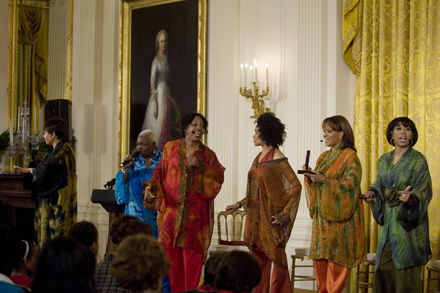Wade in the Water
 The a cappella vocal ensemble “Sweet Honey in the Rock” was formed in 1973. The name comes from Psalm 81:16: “and with honey out of the rock should I have satisfied thee.”
The a cappella vocal ensemble “Sweet Honey in the Rock” was formed in 1973. The name comes from Psalm 81:16: “and with honey out of the rock should I have satisfied thee.”
Initially comprised of four singers, the group expanded to five voices plus a six member who does sign language.
We commented recently on the work of people who collected and catalogued folk songs, many in the early 20th century. We can add to that list John Wesley Work Jr. (1871-1925), who focused on slave songs and spirituals. He taught Latin and history at Fisk University and worked with the Fisk Jubilee Singers.
The spiritual Wade in the Water was first published by Work in the 1901 collection New Jubilee Songs as Sung by the Fisk Jubilee Singers.
Work’s son, John W. Work III, continued his father’s work, becoming a scholar of the genre, obtaining degrees from Columbia and Yale, directing the Fisk Jubilee Singers, and teaching for most of his career at Fisk University. In his book American Negro Songs and Spirituals (1940), he addresses questions concerning the origins of the spiritual.
Assembled, as they were, from tribes of East, West and South Africa and the interior, their customs, habits, languages, and types of music were diverse. But the general interchange of slaves among the colonies and the uniformity of social conditions partially developed and fostered by Christianity welded them into a somewhat homogenous group, from which emerged a comparatively uniform body of song.
Were spirituals, as some suggested, derived from white gospel hymns?
It is preposterous to assume that the Negro or any other group could live in an environment rich in song, and not be influenced by it. Consequently, many of the spirituals and worksongs show traces of other songs.
The slaves picked up some of the music they encountered. But more importantly, they changed them in some culturally significant ways to make them more meaningful.
He accomplished this by translating these words or phrases into idioms, adding melodic and rhythmic motives which had already been developed and widely used by the slaves. . . . The gospel hymns usually lived just a little longer than the stay of the composer-evangelist who introduced them to the community, but the spirituals were so dynamic that they spread from section to section. Today, a century after their creation, they make an enormous appeal to concert-goers in America and Europe, and their melodic and rhythmic idioms are important elements in the music America is singing.
Work wrote this 80 years ago, and the spiritual remains a compelling genre in American music.



